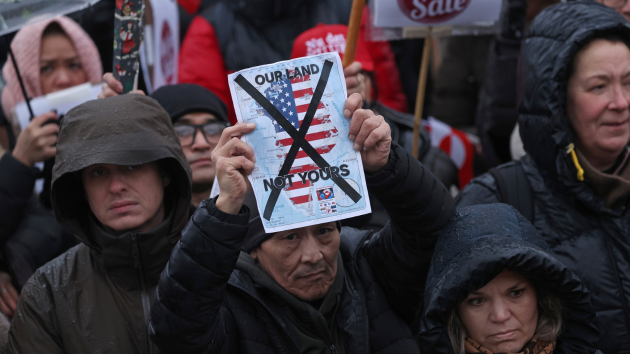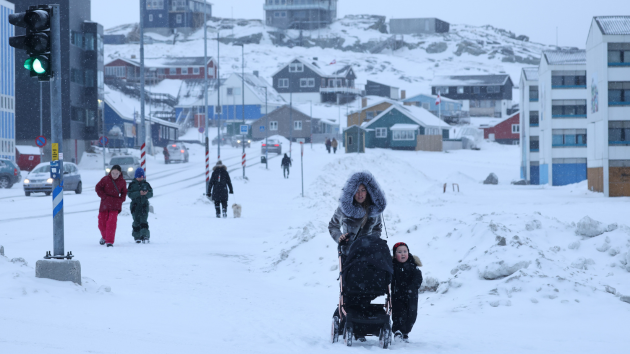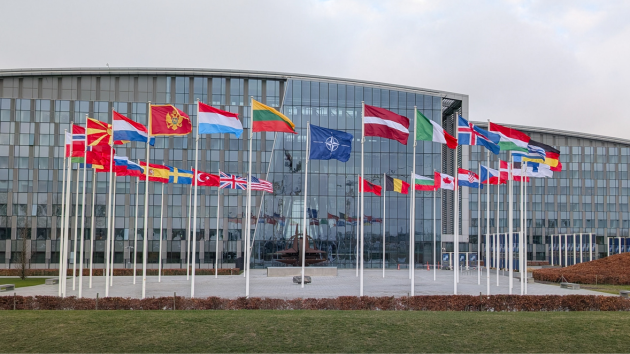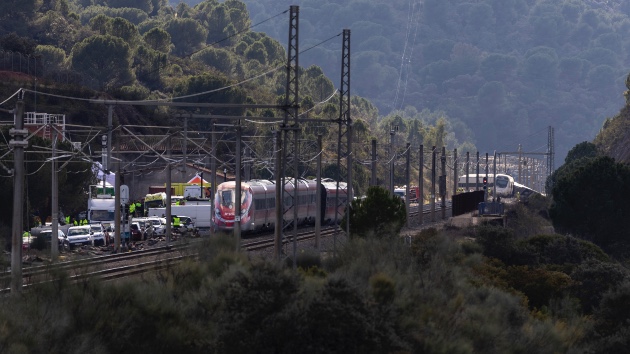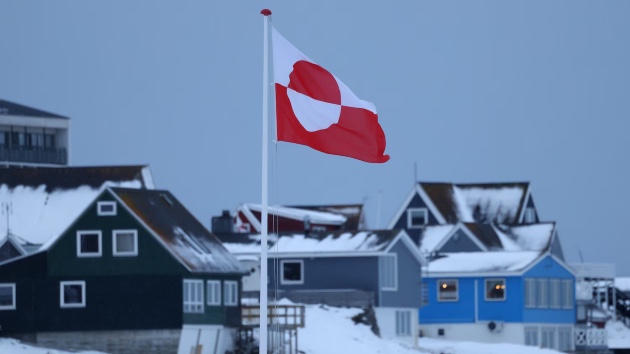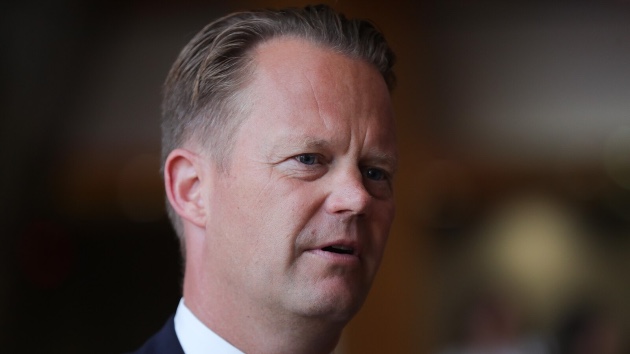
(LONDON )– Denmark’s new government was less than two months old when U.S. President Donald Trump’s campaign to acquire Greenland broke into public view in the summer of 2019.
“We thought it was unprecedented,” recalled former Danish Foreign Minister Jeppe Kofod, who then was in post and suddenly tasked with a transcontinental fire drill.
Trump’s desire for what he at the time called “essentially a large real estate deal” threw a wrench in the works of a planned state visit by the president to Denmark. The president ultimately cancelled the trip, saying Danish Prime Minister Mette Frederiksen had shown “no interest in discussing the purchase of Greenland.”
Frederiksen at the time rejected Trump’s proposal as “absurd.”
Kofod, who has since left Danish politics, told ABC News in an interview on Tuesday that the 2019 saga was “a really bad situation for the bilateral relationship.”
“We also saw it as offending a close ally,” Kofod recalled. “We were very surprised that the first major comments he had were, ‘Why can’t I just buy Greenland?'”
Copenhagen, he said, never considered formulating a price for Greenland’s potential sale.
At the time, though, Danish leaders did not believe Trump was “determined” to force a U.S. acquisition of the world’s largest island, Kofod said. Rather, the Danish government saw the proposal as a means to foster more U.S. engagement in and influence over Greenland.
Nearly seven years later, Kofod’s successors — again under the leadership of Frederiksen — have faced a more protracted and aggressive campaign from Washington. Trump has repeatedly said the U.S. will acquire Greenland — “one way or another,” he said earlier this month.
Greenland is a self-governing territory of the Kingdom of Denmark. Trump’s second term has seen the president double down on his ambition to acquire the minerals-rich island — despite Danish and Greenlandic politicians repeatedly rebuffing him.
Trump has suggested that U.S. sovereignty over Greenland is necessary to ensure American security and blunt Chinese and Russian influence in the Arctic region. A 1951 defense agreement already grants the U.S. military access to Greenland, but Trump has suggested the accord is inadequate and has demanded “ownership.”
The issue dominated this week’s World Economic Forum in Davos, Switzerland, where Trump said in a Wednesday address that he would not use military force to seize control of the Arctic landmass.
On Wednesday, Trump said during the event that a “framework” of a deal had been reached on Greenland after talks with NATO Secretary-General Mark Rutte. Details of the purported agreement are yet to be revealed.
Frederikson said in a Thursday morning statement that Copenhagen “cannot negotiate on our sovereignty.”
Greenland’s Prime Minister Jens-Frederik Nielsen said at a Thursday press conference that Nuuk is “willing to do more in a NATO frame,” but also said they have some “red lines” including territorial integrity, international law and sovereignty.
In Davos on Wednesday, Trump said that Greenland’s mineral deposits are “not the reason we need it,” though also said the professed deal “puts everybody in a really good position, especially as it pertains to security and to minerals.”
Trump’s professed security concerns have prompted Danish efforts to increase military spending in the Arctic and the deployment of small contingents of NATO troops to Greenland.
But the deployments — which the eight European nations involved said were for military exercises to enhance the defense of the region — prompted Trump at the time to threaten new tariffs against the American allies starting on Feb. 1 unless the U.S. was able to acquire Greenland.
That raised the prospect of a new transatlantic trade war, though Trump said Wednesday that he would drop the tariffs citing the purported deal.
European and allied leaders have said they are open to deeper and broader cooperation with the U.S. in Greenland, to address American security concerns and to develop shared commercial opportunities across the mammoth, resources-rich territory.
For Kofod — who said his time in office saw Copenhagen and Washington forge a “path forward” despite tensions over Greenland — any deal should be twinned with a European show of force.
“The first step is power,” Kofod said. Trump may soften his attacks “if he sees that he will have all of Europe — including the U.K., France, Germany — against him, and they are ready to defend Greenland,” Kofod said, plus if he sees that European “retaliation is so massive that it will hurt the U.S. economy and interests.”
“Trump plays with all the instruments he has. Europe has to learn to play the power game,” Kofod said, and “move him to a narrower path if this is going to stop.”
The Danish and Greenlandic experience in 2019 bears striking similarities to 2026. Then, as now, Trump set off a diplomatic storm by repeatedly declaring his ambitions to take control of Greenland.
In both instances, Copenhagen and the Greenlandic government in its capital Nuuk responded by expressing openness to further collaboration, stressing the importance of sovereignty and dispatching a high-level delegation for talks in Washington.
Kofod said the de-escalation of tensions in 2019 was achieved through closer cooperation and modernization in the security sphere. “We took the security concerns of Trump very seriously,” he said.
The period spanning Trump’s first term and that of his successor, President Joe Biden, saw the U.S. reopen its consulate in Nuuk, modernize the Thule Air Base — since renamed to the Pituffik Space Base — and agree a new economic cooperation strategy in Greenland.
Copenhagen and Nuuk, Kofod said, encouraged “constructive engagement” with the U.S. in investment, education programs, tourism and other areas.
Similar measures might help ease the current round of pressure in the High North, Kofod said.
But he added that the future of the Arctic — which was long considered an area of scientific work largely free of geopolitical tensions — will be inextricably tied to security considerations.
Climate change, the subsequent melting of pack ice and the opening of new sea lanes is making the Arctic more navigable and — potentially — more lucrative. Russia’s 15,000 miles of Arctic coastline puts Moscow at the forefront in the region, while China’s declaration of itself as a “near-Arctic state” indicates Beijing’s long-term interest there.
“That’s why Trump is right on the concern about security in the future of the Arctic,” Kofod said. “Any U.S. president will find Greenland key to defending North America and the United States.”
Trump’s efforts “fit his ideology,” Kofod said, saying his bid to acquire Greenland despite broad opposition aligns with the “Donroe Doctrine” — a play on the 1823 Monroe Doctrine by which the U.S. said it would block European interference in the Western Hemisphere — which has in recent weeks been professed by members of Trump’s administration and noted by the president himself.
“There is something to that, that I think Europe hasn’t taken seriously enough,” Kofod said. “But now they are taking it seriously.”
The turbulence will undermine European, American and collective NATO security, Kofod warned.
“For the U.S. it’s also a big self-inflicted problem,” he said. “But I don’t think Trump looks at the world like that. He thinks that NATO is there, it’s important, but it’s not something you cannot live without, because you just can form another alliance.”
Copyright © 2026, ABC Audio. All rights reserved.



